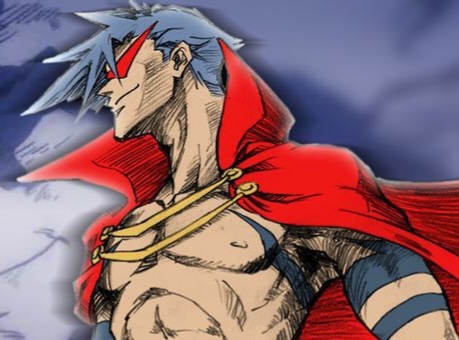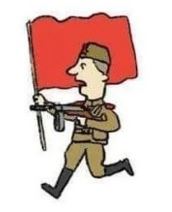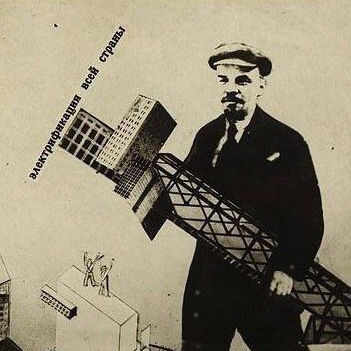To all full-grown hexbears, NO DUNKING IN MY THREAD…ONLY TEACH, criminal scum who violate my Soviet will be banned three days and called a doo doo head…you have been warned
I don’t mean this as a dunk, but usually what has to get taught about leftist politics isn’t the specific claims of Marxism or what socialism is. Usually what western people have to be instructed with is current/former socialist countries are legitimate places and not cartoonish dictatorships. The nationalism brain worm runs far deeper than the capitalist one. And it’s that kind of sentiment that will entangle itself with their understanding of what western socialists advocate.
It’s pretty normal to accept anti-capitalist sentiment, even right wingers will use that kind of rhetoric, but it’s far less normal to praise the west’s enemies or to even view them as valid human beings. It’s why it’s so common for western leftists to first and foremost condemn the west’s enemies as doing socialism incorrectly.
That’s just what I experience most of the time when I get curious questions about socialism. I might get the odd question about how you motivate people without money, but the bulk of questions are about stuff like what haircuts are illegal in the DPRK.
Usually what western people have to be instructed with is current/former socialist countries are legitimate places and not cartoonish dictatorships.
To reinforce your point here, I cannot stress enough how important a step learning actual details about the USSR and China was for me. Because as you say, people don’t think of these as real places where countless real people had mundane, normal lives, they just imagine literal cartoon caricatures they passively absorbed from pop culture. Like one that stands out to me is reading a thorough description of the Soviet court system, where even though it took pains to stress how dysfunctional this feature or that feature was all I could think was “I’ve had family go through the courts in the US, I’ve seen firsthand what a completely mad and not at all functional system the US has, and by comparison what the Soviets were doing over half a century ago was meaningfully less dysfunctional than what we have now.”
And for China, ironically it was something from anti-CPC ultras (Sorghum and Steel) that helped me realize what China had even been doing at all, because even if they stressed this systemic failure or that one they still went into detail about what the policies in question were, what the material situation on the ground was, and why those decisions were being made, leading to a clear picture of China struggling against an impossible material situation and eventually succeeding. Like every western history is just “grr arrg mean devious celestials tricked the peasants and then Mao ate all the sparrows cause they’re dumb, grrr” but in the actual context even the catastrophe of the Great Leap Forwards starts to make sense in terms of the model emerging from rural communes that had implemented it successfully (or were claiming to have done so, at least) and the model of highly decentralized rural industry that’s far from the coast being extremely appealing given how vulnerable centralized coastal industry would be in the event of a war with the US; the Great Leap Forward didn’t work in practice, obviously, but there were clear reasons and pressures behind it instead of just the “lol gommunism dumb no food where iphone” bullshit that makes up the sum total of what liberals believe.
Yeah I sympathize with you here. I kind of arrived at communism in a non-standard way that didn’t involve much nationalism to jump over (I arrived at communism through an intense hatred of America during the Iraq War). But I did have to learn how other countries deal with things in different ways, based on the circumstances given to them.
Your court system example is good. I’ve gotten people to realize they were wrong about their warped view of other countries by simple things like showing them pictures of people walking around Moscow in the 70s, or showing them contemporary Chinese movies or music. There are some good videos on YouTube of people walking around Pyongyang and everything seems normal. That stuff is powerful, because there’s no warping it. People in socialist countries by and large have normal lives full of the same mundane things everyone else does.
i had a similar experience reading some anti-communist (i think) book in college, i forget the title but the primary antagonist guy was some bald guy with a scar on his head that would turn colors or writhe whenever he got mad, like the author was making fun of the scar, and this character basically resented the rural peasants for picking their noses all the time and just being generally ignorant uneducated people. like the whole point of the book was about how stupid and pointless it was to try to turn these idiot peasants into Modern Socialist Revolutionaries, but like all the reasoning and actions the ‘antagonists’ took made perfect sense to me the whole time. i forget most of the details since it was so long ago so its possible i just assumed the book was meant to be anti-communist and it was actually making some 5-d irony chess point that i would agree with if i noticed it. idk.
What’s the book?
i wish i knew, i can’t remember the title for the life of me
deleted by creator
Yeah I agree with this totally, it’s why I try to hammer home that people focus on breaking down nationalism first and foremost, it is the primary issue.
imperialism is the current greatest threat to socialism worldwide, so much of a threat it even trickles down as brainrot in the minds of western people
Once nationalism is destroyed in a person they become incredibly easy to talk to about socialism though, they lose the kind of anti-tankie brainworms that exist and start taking internationalist stances. It’s so easy to reach someone that has genuinely not got nationalist brainworms.
If we could figure out a strategy as reliable at breaking this down as, for example, the strategy that has reduced military recruitment… Things would really start cooking for us.
I feel like nationalism (of rich first world nations) is a part of, or at least an extremely useful tool of, Imperialism.
It’s a division of the international working class into sub-groups that are then pitted against one another. If you take the perspective that racism is used within a country to divide the various groups of workers up into identity groups that are then made to fight one another internally it is the same tactic but at an international scale. Skin colour and sexuality as identity groups is just substituted for national flags as identity groups. Same old story, divide the working class up to fight each other, and rule them.
What’s it truly like to live in communist north korea right now? I know that most of the buzz around how it’s a failed state and they’re starving the people are mostly propaganda, but it’s so hard to tell fact from fiction especially since there’s propaganda within the state as well.
I don’t claim to be an authority, but I have spent the last couple years trying to learn about the DPRK as much as I can from more independent sources (like from people from China who go there as tourists).
From a material perspective… very broadly it seems like it’s better to live in the DPRK than to be poor in the United States, but someone in the US who isn’t poor is probably better off than most DPRK citizens. That of course should not be a surprise, given how heavily the DPRK is sanctioned and how restricted their trade is. Interestingly from the time shortly after the Korean War (after the DPRK was able to recover from having every bit of its industrial capacity destroyed and ~20% of its people killed) up through the 80s, the DPRK was seen as the wealthier of the two countries on the Korean Peninsula.
Honestly, the only way to deny that the people of the DPRK are doing ok materially is to use the line about how whenever you see videos of people having fun a water park or whatever, they’re all just actors. For that, idk I think any application of critical thinking would tell you how ridiculous that is.
That said, there’s some truth to the famine thing, but that’s more an artifact of recent history. There really were famine conditions and suffering in the 90s. But that was more a function of some unique weather/climatic conditions plus the collapse of the USSR. The environmental and terrain conditions in the DPRK are not ideal for farming (cold and mountainous), so there’s a lot less margin for when things go bad. The famines could have been alleviated if the DPRK was allowed to have normal relations with other countries, but at the time the US and their allies used that suffering to try and put the screws to the DPRK instead.
I don’t know enough about the political situation to be able to speak to it with confidence.
What a cruel thing the US did to use the suffering of the north koreans as ammunition against north koreans
Wait till you read about what the US did to the people of Nicaragua by supporting the Contras (who were for all practical purposes a part of the US military), if we’re talking more recent US atrocities…
I’ve known people who’ve been there. I’ve known an Indonesian guy for instance who used to go on vacations to the DPRK to go skiing. Apparently it’s a fairly normal vacation destination for Indonesians because they can get into the country easily.
From what’s described to me, day to day life is pretty comparable to any other poor country in Asia. Life out in the countryside is probably the hardest. It seems like the worst aspects of living in the DPRK all relate to poverty rather than the cartoonish goofy dictatorship that westerners claim the country is like. They don’t have great internet access, but from what I’m told nearly every person in the DPRK buys USB drives full of pirated stuff anyway.
Other than their media, the DPRK is pretty normal, and in fact doing quite well considering their decades of sanctions and international aggression. They haven’t had widespread food insecurity in a while. Their healthcare system seems stable. They had energy instability for a while in the 90s they seem to have managed.
This is a fascinating documentary called My Brothers and Sisters in the North by a South Korean woman who had dual citizenship in Germany and then used that German Citizenship to visit the DPRK.
https://yewtu.be/watch?v=nSd48emp0lI
She goes to a number of different places in the DPRK and visits people living much different lifestyles.
Things to remember when watching vids regarding inside DPRK is that they are basically under siege by Western Powers for almost a century now. So when they’re being interviewed, they’re basically talking to extensions of their oppressors and they’re very aware of that.
There’s also The Haircut by BoyBoy. https://yewtu.be/watch?v=2BO83Ig-E8E
You’ll probably recognize some of the locations they went to from the documentary as there’s a basic tour every tourist goes on and then people who visit as part of the DPRK’s cultural exchange program get to visit more relevant locations to their project in addition.
Speaking of. If you can find a torrent of Aim High in Creation you’ll get to see a much more behind the scenes look of people in DPRK just doing their job and living their life. The facade of stiffness falls to the wayside and you get to see Filmmakers who aren’t typically dealing with tourists just being themselves and shooting the shit. See if you can tell when the Australian director is being inadvertently rude to them.
Keep in mind that the DPRK had 20% of its people killed off in a matter of 3 years and much of its land destroyed.
So, while there have been a famine in recent memory (during the 1990s), this has been a result of the economic embargo and sanctions on the country.
I’m trying to be as honest as I can with you here.
Yeah that’s wild, i just listened to the Blowback podcast and during the korean war the US military ran out of north korean targets to bomb.
People keep referencing that north korea is a hermit kingdom and that it actively does not want to participate in the global economy and … that makes sense? I too would be paranoid and disinclined to negotiate with the outside world after having the outside world literally burn me into rubble.
Keep in mind that North Korea, or the DPRK, can’t really trade except for with countries like China and the Russian Federation (and even then illegally while those two countries look the other way).
It’s literally in an embargo that’s been going on for decades now.
That too. Although, I wonder what the terms of the embargos are, and what north korea has to do on their side to appease the west and allow trade.
Oh why is this country so corrupt and backwards! Let’s put more sanctions in to restrict its trade and starve its citizens.
Western logic 😵💫
what north korea has to do on their side to appease the west and allow trade
Cuba tried to ask for such terms and was told no terms would be offered.
Per Blowback, Che offered to the US, in exchange for lifting the blockade:
-
No exporting Revolution
-
No military alliance with the USSR
-
Cuba wouldn’t / couldn’t directly pay back the US for appropriated property, but were willing to reimburse the US over time through terms of trade
Really, the only non-negotiable was that Cuba was a communist country, and would have communist governance and a communist economy. JFK thought it was a sign of weakness on Cuba’s part and turned them down.
-
Yeah, there are virtually no terms (from what I’ve read), as the country’s leadership is seen as undemocratic and dictatorial and, therefore, the United States and its allies dictate the terms (and DPRK has to follow them) while North Korea doesn’t get a say. It is called a rogue state partly for that reason (as opposed to a country like Saudi Arabia, which has often been a staunch partner of the United States).
But we know that it has a functioning democracy at various levels; certainly no worse than most Western democracies.
That too. Although, I wonder what the terms of the embargos are, and what north korea has to do on their side to appease the west and allow trade.
Most of the recent-ish embargoes (last few decades) are most directly the US and friends punishing the DPRK’s development of nuclear weaponry. This is plainly because the nuclear arms are one of the DPRK’s strongest deterrents to US invasion, since it’s not as though the DPRK wants to use those weapons or intends to except under the circumstances of being invaded by foreign powers.
deleted by creator
There are a dozen of stories like this, because I feel like every president has tried to be the one to “fix” the North Korea situation.
Bill Clinton actually negotiated a standown of the DPRK’s nuclear program during his presidency - in return, the US would fund and oversee the construction and operation of two large power plants in the country to make up for the loss of nuclear power.
When he brought the deal back to Congress, they refused to ratify it. You could build two power plants with spare change in Congresses couch cushions, and the US was running a surplus at the time thanks in part to Clinton gutting welfare, but they refused on the grounds that they didn’t want to pay for it and after waiting six months the Kim Jong Il government realized it wasn’t going to happen and started up their nuclear program again.
Imagine what else could have happened over the last thirty years if we had gotten the snowball rolling with this one deal cooperating with the DPRK.
If you’re interested in what the UN sanctions resulting from their nuclear program are, they’re here and they are very very broad.
They used to trade with other countries. They were unique in the communist world for how much they traded with capitalist countries. It’s why they outperformed south Korea for so long. The embargo against them crashed their economy (along with the collapse of the USSR) which led to the crisis of the 90s until now
Oh, also regarding defectors. Most that you hear about are monetizing their story through USA backed Libertarian think tanks. Atlas Network being the big one. Freedom Factory is another if I remember correctly.
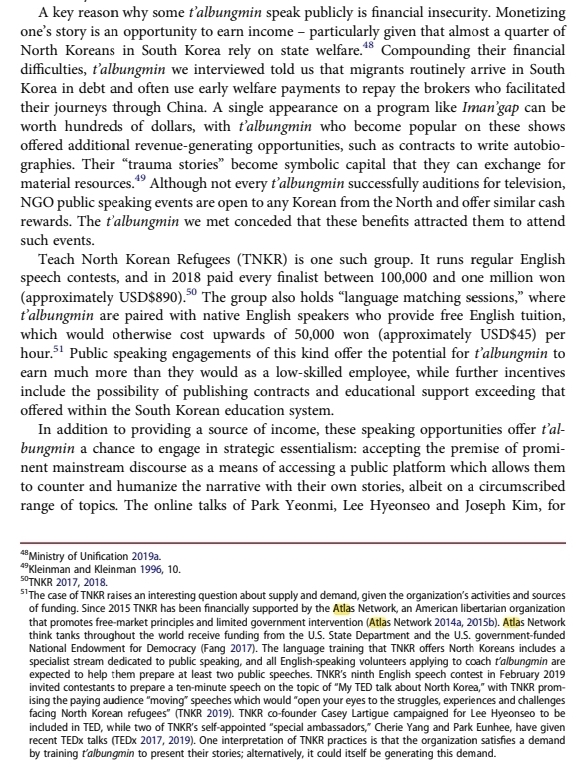
i swear. Propaganda, propaganda everywhere. We talk about America having “free speech” but it feels like the only ones able to speak and have their voices heard are the ones that are able to buy their way into the ears of millions through social media and mainstream media.
Manufacturing Consent machine goes

Noam Chomsky - The 5 Filters of the Mass Media Machine - this is a quick little 5 minute primer on the topic, if you’re not familiar.
I see you’ve listened to Blowback, have you had the opportunity to watch Yellow Parenti yet?
I found a YouTube link in your comment. Here are links to the same video on alternative frontends that protect your privacy:
Yeah, NK’s state media has always had a very off and somewhat idealist view of the DPRK. Most information you find on the nation doesn’t pass the sniff test. They also seem to be the oddball of the socialist countries.
This is one that made me question the western narrative on NK. An article about a stoner getting some North Korean weed and smoking in a restaurant like it was no big deal.. Very good read
The demonization of marijuana is such a bizarre thing. The US wanted to criminalize black culture so they deemed weed in the same category as meth or heroin, and countries in the imperial core and imperial periphery followed suit. But in places untouched by US influence weed is just … a part of their lives and culture. Just another plant that made you feel funny, like tea. And it’s refreshing to see places where weed isn’t just a drug that was decriminalized and made legal again, but actually had its legality preserved throughout and had no taboo associations stemming from it.
Anyway, fuck US culture for demonizing weed and shrooms. The US single-handedly destroyed a source of innovation for mental health research globally for having such a draconian stance on them and sheeple countries follow suit.
As someone with schizophrenia, I can say that the west demonizing psychedelics (shrooms and DMT specifically) has probably set back the treatment of schizophrenia really hardcore. There is a very heavy DMT presence in schizophrenia. I don’t know what role is plays exactly, but it is clear as day that DMT is partially responsible for the visuals. And people around me say I pretty much always act like I’m on shrooms. Psychedelic trials are essential to ever getting good schizophrenia treatment.
Also, the coca leaf was a lot like this before the west came in. Chewing a coca leaf doesn’t get you super high, it’s like a slightly harder cup of coffee, not even particularly addictive when treated right. America literally ruined every common plant medicine. Even starting to fight kratom even though kratom is essential for alleviating the fentanyl crisis in the nation. The US wants criminals, not functioning people
Yeah I’ve had coca leaf tea and it was just a mild stimulant like caffeine except smoother, felt calm but focused
If leaf was available to me, I’d never touch caffeine. I don’t react well to caffeine, but find low dose nicotine or cocaine to be insultingly effective. I can’t really handle doing coke recreationally, it’s just too much on my body. But it was the stim that hit me the way stims are supposed to hit people with ADHD. So the few times I’ve gotten actual leaf, it’s been an amazing few days of functional medication.
Coca isn’t addictive until it’s extracted out of the plant. One line of coke is probably like taking 10+ leafs at the exact same time in a way that’s far faster than chewing.
I don’t think anyone here really knows. The only people who know are defectors, and not only are defectors themselves not always reliable (Yeonmi Park being the obvious example), documentaries and interviews where defectors tell their experiences will often be edited to fit certain narratives. Not even necessarily for nefarious purposes, but for the same reason that spooky, ominous music plays when a documentary shows a lion sneak up to a gazelle. Telling scary stories about how kim jong-un will execute your family for wearing a tie he finds ugly will keep audiences more interested than “it really isn’t all that special over there, you guys” and since there’s 0 consequences for making up outrageous lies (since nobody is able or willing to fact check you), that’s what we get.
I’m more inclined to believe what I hear from the DPRK itself, but I don’t think anyone here can truly tell you what life over there is like.
I have distant second hand experience I guess. I’ve known two people who lived in the DPRK as transfer students, both Indonesian. They describe it to me as like most other places in Asia, just poorer. But you’re right, I have no idea what it’s like living there long term and I’ve never spoken with someone born there. It’s extremely rare to personally know a North Korean, so wild stories get passed around.
I don’t think anyone here really knows.
There are plenty of videos of people visiting. We know. It’s just a country, it’s full of regular people, they watch movies and play video games and read books and dance and go on walks and work normal jobs. They’re very poor and have infrastructure problems relating to the fact that they’ve been under siege ever since every major city in the country was leveled, but they’re doing pretty well with what they’ve got.
You could easily find footage of the DPRK from Chinese tourists to get a feel of everyday life:
https://www.youtube.com/watch?v=v7vZ0NhutDM
https://www.youtube.com/watch?v=CPdEeKHuBmc
It’s obviously not the same as actually living in the country, but that’s true for every single country on Earth.
I found YouTube links in your comment. Here are links to the same videos on alternative frontends that protect your privacy:
Link 1:
Link 2:
I have a friend that spent six months in the DPRK studying. She didn’t have to eat rats or dogs or push trains.
I’m by no means an expert but some factors to consider are that there’s a very extensive economic sanctions regime in place against the DPRK.
What that looks like on the ground is that there’s very little oil because it’s hard to import, meaning that there are few cars and a heavy reliance upon mass transit and electricity instead (e.g. trolleybuses).
It also means that they don’t have as much access to things like cutting edge medical technology.
For farming, as manufacturing modern agrochemicals is often very energy intensive and reliant upon oil (do we even use the term petrochemicals? Lol. It feels like all of our chemicals are derived from oil these days…), they tend to be much more low-input chemical-wise and this affects yield as well as the environment (e.g. less chemical runoff in the waterways, all things being equal.)
There’s the focus on militarisation of the DPRK in the western media and this is a response to the Korean war and the very obvious attempts to destabilise and destroy their political system. Their recent advances in nuclear arms and ICBM technology has given them a degree of breathing room as it’s a pretty well established fact that this creates military deterrence that was otherwise being maintained through a very strong focus on a conventional military with a large financial investment in that. These days it’s not as high a priority to have such a strong army, for example, and they don’t need as much artillery aimed at Seoul to feel some degree of security knowing that nuclear missiles are going to fulfil the same purpose. (Am I cribbing my notes from Stephen Gowans here? You bet I am!) I would expect to see the DPRK gradually scaling down their investment in conventional military and reorienting their economic priorities towards infrastructure and other civilian purposes but I’d expect to see just as much military pageantry because they won’t want to expose their flank to the rest of the world unnecessarily. This means we should see better outcomes for the average citizen of the DPRK.
The west is preoccupied with the notion of Potemkin village narratives in the media. Everyone and their dog will point out how some building with no lights on is proof that an entire residential block is just for show or how the passengers on trains in the DPRK all appear to be actors or whatever. This is largely nonsense and a product of westerner tourists coming down with diagnosable cases of Main Character Syndrome and I wouldn’t give much credence to these stories. I mean, I’ve been hearing that China is on the cusp of collapsing for about 25 years now and that it’s going to happen within this year for real this time so I’m a bit reticent towards sensationalism in the media. When the media focus on the DPRK, one of the biggest names is Yeonmi Park who talks absolute rubbish. Plenty of what she says is either absurd, contrary to basic science, or easily fact-checked and disproven. Often her stories are not even internally-consistent.
She claimed that she was so propagandised that she didn’t recognise that Kim Jong-Un was fat. Like, she couldn’t conceptually grasp that he was fat. Not that she wasn’t allowed to talk about it or that there was propaganda explaining why but that she would look at a picture of him and she would be unable to see it.
I mean, come on…
Obviously there’s the famous Joe Rogan interview where she said that there was one train that ran in the DPRK (completely false), that it would only come once a month (again, completely false), and that people would often have to get off the train and push it (I’m sorry, what??). This is directly after saying that people would hang around the train station starving to death and there would be children who were so starved that all their organs fell out (???) and that rats would eat the corpses of victims of starvation and that people starving at the train station would hunt the rats for food.
If that were true we would have satellite images of it. If that were true people wouldn’t stand around starving to death at a train station, they’d be hunting and foraging elsewhere. If everyone was starving so badly then nobody would have the strength to walk, let alone to push a train (which is an absurd amount of weight to try and push regardless of how well nourished you and your fellow passengers are).
I have to admit that I don’t follow Yeonmi Park’s appearances in the media closely but if she’s the leading voice in the western media for what things are like in the DPRK and, at least to my knowledge, no journalist has confronted her about her inconsistencies, her outright fabrications, and her ridiculous claims let alone challenged her on any of them then I’d say that it’s a safe bet that the standard for journalism on the DPRK is abysmally low and it should be regarded with deep skepticism.
There are other things like how there’s an effective blockade on people from the DPRK leaving to go to other countries. This is something which was passed by the UN Security Council as a part of sanctions on the country, although the received wisdom is usually that it’s the DPRK government who imposes this on its citizens.
Same goes for starvation or lack of food. If you look at Security Council resolutions (not that I expect people to do this but…) you’ll find the US pushing for outrageous sanctions on things like oil and food imports and you’ll have China threatening to veto the resolution because this would cause destabilisation of the DPRK due to the measures being so extremely punitive, meaning that often before the final resolution passes it gets watered down enough that the average citizen of the DPRK isn’t facing abject starvation conditions but only because China is curtailing the US’ designs. I’d need to dig back into old resolutions to get a clear picture of this but there was the Deng Xiaoping era onwards where China pivoted and began playing ball with the west, in a dramatic departure from the Mao era, and they were not nearly as strong militarily, politically, or economically so I would venture a guess that China being firmer in its negotiations at the Security Council with regards to stuff like the DPRK is a relatively recent shift. But basically any country which is cut off from the rest of the world’s agriculture is only one environmental disaster away from starvation. Modern agricultural practices ameliorate this to a certain extent but if your country is cut off from them as well then you’re in a precarious position.
But yeah, it’s extremely hard to distinguish fact from fiction when it comes to the DPRK and you’re not alone in feeling that way. My default position for anything about the DPRK is false until proven true and to be wary of the interpretation of the facts, for example what I mentioned above where it’s a function of the UN Security Council resolution that prevents DPRK citizens from travelling abroad rather than some cynical plot by the DPRK government to control the movement of its citizens.
I would expect to see the DPRK gradually scaling down their investment in conventional military and reorienting their economic priorities towards infrastructure and other civilian purposes
The military in the DPRK handles a lot of civil works.
Am I cribbing my notes from Stephen Gowans here? You bet I am!
Lol I thought I saw this somewhere.
There are other things like how there’s an effective blockade on people from the DPRK leaving to go to other countries. This is something which was passed by the UN Security Council as a part of sanctions
I’m curious to read more if you have any links.
I’ve got you comrade, parsing through the UN website is worse than hell. Here’s the link to resolution 1718 which details the sanctions imposed on the DPRK. I’m parsing through to find the relevant bits on restriction of nationals but even if you just read through, any risk adverse nation will bar them to comply since the sanctions are so broad.
Edit:
Found them!
Travel Ban - Set out in paragraph 10 of resolution 1718 (2006) and paragraph 10 of resolution 2094 (2013)
All Member States are required to prevent the entry into or transit through their territories of designated individuals; individuals acting on behalf of or at the direction of designated individuals; any individual whom a State determines is assisting in the evasion of sanctions, violating the provisions of the resolutions, working on behalf/at the direction of designated individuals; and individuals traveling for the purposes of carrying out activities related to the shipment of items for repair, servicing, refurbishing, testing, reverse-engineering, and marketing.
Ban on DPRK workers abroad - Set out in paragraph 17 of resolution 2375 (2017), Set out in paragraph 8 of resolution 2397 (2017)
All Member States are prohibited from providing work authorizations for DPRK nationals in their jurisdiction in connection with admission to their territories. All Member States are required to repatriate to the DPRK all DPRK nationals earning income in their jurisdiction and all DPRK government safety oversight attachés within 24 months from 22 December 2017. Member States are required to submit a midterm report after 15 months from 22 December 2017 and a final report after 27 months from 22 December 2017 to the Committee of all DPRK nationals that were repatriated based on this provision.
Dang. How did I not know this. Thanks for looking it up. Hopefully the decline on Amerikan empire will end this.
imgur album with almost 400 pictures of life outside of pyongyang: https://imgur.com/a/BybJ7DQ
An Imgur link was detected in your comment. Here are links to the same location on alternative frontends that protect your privacy.
jaka parker has videos of this on youtube https://vid.puffyan.us/watch?v=e6STm0seel8
indonesian diplomat, has no real commentary, no handlers. just shows daily life in the country. its not a rich place, it is severely lacking in industry due to western sanctions, but there are some interesting things going on, particularly in regards to housing and food distribution. a lot of places in asia look a lot like north korea, there is new development that is very good, and there is dilapidated rural areas. its important to understand that this region used to be worse off than africa. china has many similar issues, but have been able to rapidly advance due to deng’s reforms.
Ehh compared to Cuba North Korea has excellent industry. Honestly DPRK heavy industry looks pretty decently developed.
their methods of transportation definitely need some work, but theres a lot of stuff going on. ox carts next to trains and industrial equipment building skyscrapers.
Once again compared to Cuba it’s leaps and bounds ahead. They have electrified freight and passenger rail with daily trains to Beijing, several tram and trolleybus systems and a suburban rail network in Hamhung (not sure how that weird little railway works tbh).
Removed by mod
on Netflix there is a Series “Crash landing on you” , watch it ! Its great and this way you will understand "how south Korea " sees it… and this way you will then get to a more hollistic view.
on Netflix there is a Series “Crash landing on you” , watch it ! Its great and this way you will understand "how south Korea " sees it… and this way you will then get to a more hollistic view.
Both my husband and I are children of expats from former Soviet countries. And while I think I’m fairly open to socialist ideas, I do get caught up on the fact that the people among our relatives who are most nostalgic for the Soviet Union are also VERY racist, homophobic, terrible to animals and just generally mean to everyone around them. And their food, in all its hyper-processed mystery meat and mayonnaise glory, kinda sucks.
Any tips for getting over that bias?
There’s a Chinese communist from the early days of the CPC - and I feel bad that I’ve forgotten his name - who I have read some of his thoughts on this. He said the first generation after the revolution will still have brains full of worms, even among the best and most upstanding comrades. This will get better over time, but you’re talking many generations. Because we are all products of our environment. We cannot escape the social conditions we grew up in. Being a communist doesn’t mean you are now some new person completely cleaved from any connection to the world around us and our personal histories. The Soviet Union did make attempts to fight sexism, racism, nationalism et al within their borders, but thinking you can just propagandize people into right thinking is idealism. The USSR had to start with the social conditions they inherited - and that society, which was part feudalist part capitalist - had a lot of sexism, racism, nationalism, etc (and of course cruelty to animals).
I’ll make a confession: I still sometimes have reactionary thoughts and ideals pop into my head. And it takes active, conscious thought to tell myself “what the fuck dude, cut that shit out”. If I was not actively engaged in checking myself on that, it is possible that the brainworms could come back. It’s something we are all susceptible to in some form, I think.
What you’re talking about was also very much the basis for the idea of the “New Soviet Man” and versions of this can be found even in Lenin’s writings. We can at least see that some forms of sexism were systemically combated to the point that even the now-former Soviet states have much higher rates of women in STEM and such.
He said the first generation after the revolution will still have brains full of worms, even among the best and most upstanding comrades. This will get better over time, but you’re talking many generations.
I can’t help but compare this to western leftists drawing smaller and smaller circles around who is leftist enough to work with.
This is one of the reasons I think we need to repurpose Christian rituals, at least in Christian communities. A symbolic washing away of your old self, confession, the importance of good works informed by study and the faith in the coming rupture, communion and fellowship and sharing of bread across social divisions, etc. We need communist churches
Jonestown
I think reading Blackshirts and Reds by Michael Parenti would be helpful. He doesn’t make excuses and acknowledges the racism in the USSR. I think laying bare the actual shortcomings of the project places it in reality instead of the cartoonish evil depicted by mainstream Western history. It allows for a clearer understanding of the good alongside the bad and shows where we can improve in the next iteration of a socialist project
We’re all human and need to see where we can do better, and despite the issues of past socialist experiments, it seems to many here that this form of government is the most likely way for humanity to do the most good for all
I think it really is a generational thing, especially with people who grew up during the liberalization era. Plus people wrongly try to make sense of the collapse of their lives, so they may fondly remember Communism, but associate their new shitty conditions with stuff like LGBTQ rights instead of everything else the west brought. This is why a cultural revolution was a necessary idea, even if not executed well. People didn’t retain the materialism of the ideology even if they are nostalgic for the world it created.
I always think about this conversation @[email protected] and @[email protected] about her family and how her grandmother so quickly became pro-LGBTQ, while her more liberal parents are not as quick to change. https://hexbear.net/comment/3310448
Yeah she pretty quickly came over once she read some literature on it. I think the conditions of her time made communists more left thinking, I do really believe that if somehow the communists kept continuity and were able to stay in charge, czechoslovakia would be one of the most LGBT accepting places on the planet, along with Cuba. The biggest things that seem to help LGBT acceptance imo are urbanization and access to information. I really want to do a deeper dive on numbers and historical circumstances for LGBT people in every country so we can see what policies are best to aim for in the long term. Right now, a lot of queer research pretty much is just
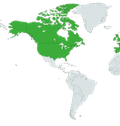
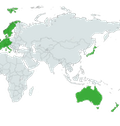 governments saying their allies are good for queers and doesnt attempt to predict trends
governments saying their allies are good for queers and doesnt attempt to predict trends
This has more to do with the 1990s to 2010s than it does with the Soviet days.
yeah, like FDR sent japanese americans to internment camps but doesn’t get very much shit for it in the public consciousness, whereas anything any soviet did ever that was anything less than perfect is an eternal repudiation of the entire ideology of marxism and leftism. Churchill allowed the bengali famine to happen (and was like suuuuuper racist just in general) but he’s just a fun cigar smoking wisecracking character to most people instead of the cartoon 1984 joker madman mafia boss dictator Stalin gets portrayed as. compare basically any action of any soviet leader or organization to what their capitalist counterparts were doing at the time, and it becomes a very favorable comparison for the soviets. like no modern socialist thinks the wartime conditions of 1940’s russia is anything to strive for, but they did what they had to do at the time to survive and its frankly victim blaming to see them as the badguys when most of the poverty and harsh measures taken in the USSR at the time was due to wartime conditions and the nazi’s genociding and slaughtering their way halfway across russia (keep in mind germans and their collaborators did not think slavs were human and did not take prisoners or allow civillians to flee)
I do get caught up on the fact that the people among our relatives who are most nostalgic for the Soviet Union are also VERY racist, homophobic, terrible to animals and just generally mean to everyone around them.
i’ve noticed this when talking to my cousins abroad but have no answer, because it’s kind of true and disturbing, but at the same time in the US, mean american people wander into my life all the time. I think that the US is just slightly ahead of Russia in what you might call the less-economic types of a cultural revolution (specifically, LGBT rights, animal rights, etc.).
Creating a socialist world is the only chance we have at eliminating that kind of bigotry. People are the products of the societies that created them. We can’t simply tell people to stop being bigoted. Education only goes so far. We have to completely destroy the conditions that lead to bigotry in the first place.
I used to have that same bias you had and that’s how I got through it
Both my husband and I are children of expats from former Soviet countries
you mean “immigrants” right?
It might be pertinent to question how when they left and why factor into it, though that is probably a doxxing risk to share here.
I think one of the most important things to keep in mind is that there are Soviet nostalgics and there are socialists (anarchists and communists).
Most people who are socialist out of politics and not out of a desire to see the old country relive its glory days are going to be very progressive on matters of race, gender and sexuality, animal rights etc.
Not all of them by any stretch of the imagination and, as an example, I’m in discussion with an anarchist outside of this platform who is saying really ableist and borderline eugenicist things so there’s absolutely a whole lot more work to be done and I’ll be the first to admit it. But generally I expect to see a fairly high standard of being progressive on these sorts of matters and I expect to see big, ugly intraleft slapfights that occur when someone is really backwards on these things (especially if it’s an organisation.)
For example, you could ask most socialists what word springs to mind when they hear the phrase Communist Party of Great Britain/CPGB and they’ll probably wrinkle their nose and say “TERF” lol.
For someone who is a communist, I’d expect that Soviet nostalgics and I would be 50/50 on finding common ground and on being in such disagreement that we’d butt heads and get into heated arguments over it. But it’s also worth mentioning that I feel that would be the case for most people around the grandparent age.
I mean, I live in a racist shithole and when I meet people (especially white people) I kinda just brace for the racism. I present as masculine so I’m also bracing for the misogyny, mostly coming from other men. This tends to intensify the further back you go by birth year. I know that certain politics definitely attracts types of people (you’re going to find more homophobes in a conservative party and you’re going to find more vegans in a professive party, obviously) but I think a lot of your experiences with Soviet nostalgics could probably be attributed to a generational thing as well as the fact that in some countries Soviet nostalgia is, in a sense, a “conservative” or pseudo-conservative position.
how does the toothbrush schedule work?
it’s more of a waiting list/lottery situation than a “schedule”
The most efficient toothbrush use will be optimized with linear programming.
I put tokthburhs in my buthol
This depends on just how efficient the Toothbrush Snatching Squads will be, a raging debate in leftism is whether we’ll get 30% or 90% of all toothbrushes, but nobody knows for sure
sometimes i wonder if we would even need toothbrushes if our food wasn’t full of processed sugar because corpos want to get us addicted to their slop (they put more sugar in than you can even consciously taste in some foods, to make your body crave more of it instinctually)
fluoride in the water goes a long way towards population teeth health. some people could probably get away without brushing, even with a shit diet, but it’s better to brush anyway because you can have problems besides cavities that are risk factors for other things.
definitely, no one should stop brushing their teeth now or in the future because of the post of some random internet idiot (me)
Dear socialists you claim to hate the USA, but you follow a doctrine started by the us state department (it’s even in the name soCIAlism): curious
Oh shit oh fuck

But what if I’m an introvert? I don’t wanna be forced to socialize
GRAB YOUR GEAR AND GET IN THE TEACHING TRENCHES!
real
Shitposting is praxis.
I have two cows. What’s gonna happen to them?
Subsistence farming is very different from owning means of production and exploiting workers. Unless your two cows are a metaphor for owning land and cattle that are worked by peasants while you keep the surplus value literally nothing happens.
actual subsistence farming is pretty comfy too.
People have a bad image of subsistence farming because the only people who are subsistence farmers now are people in the 3rd world, where resources are directed towards cities and people in rural areas often lack clean drinking water (which is dirty due to the high population of said land)
Back in neolithic/bronze age times, the Indus civilization had an average height of 5’8" which meant they were eatin’ good. (That’s tall for the time). It’s also known that the Indus sites lacked a lot of the social stratification found in Western Mideastern sites. The average subsistence farmer today is probably like 5’5" due to malnourishment and dirty water.
It’s similar to how hunter-gatherers today are super malnourished people in shitty desert climates, even though there were hunter gatherers in lush green fields thousands of years ago
Subsistence farming with added modern luxuries under communism would be incredibly comfy and not at all oppressive
Ehhhh it depends what you actually mean by subsistence farming. Growing a good portion of your own food on a home scale? Sure, it can be simple and fun. Growing all of your calories and micro-/macro-nutrients for the year? Takes very intensive planning and management, and more physical labor than many are used to (even with technology). Of course it can still be a very rewarding lifestyle, but it’s by no means easy or idyllic.
If you want to see what it takes to grow your own diet for a year, I highly recommend the book How to Grow Your Own Vegetables and the associated exercises from Grow Biointensive. It’s an eye-opener, for sure.
I hire a furry to draw them as smokin hot babes
They will die, as will we all.
I can’t believe socialism would do this
Maybe in communism we can make the cows immortal
Juche necro-moo-ncy
As pets?
they are cut into cubes and portioned out to everyone throughout the country
i like cubes
YOU have 2 cows? No no, WE have 2 cows.
Uhhh, I guess there’s a CW on that article for having a homophobic term/a term that could be interpreted as homophobia.
The editor really dropped the ball by not adding an editor’s note to explain that clanger.
they’ll probably moo once or twice
EDIT: Serious Answer -
Its Part of the Psyop is that they dont tell you about “Personal Property” , they only give you Private Property a word that includes Multinational Corporations and your Toothhbrush. To the cows will happen what you choose for them …
Uh, the people that milk them, slaughter them, cut them up, etc. now own them if they go to market. If you’re doing subsistence farming + a little bit to market that you yourself do, you own them. If it’s decided during wartime that cow production is a strategic necessity that has additional considerations for the purposes of defence, the state now owns them until it is no longer a strategic necessity (this largely applies to weapons production, and certain resource sectors. Cows are unlikely, but wheat and oil are very likely. Basically, you don’t want the entire socialist system to be held hostage by a tiny minority who happen to be providing a very broad necessary good. For instance, the amount of wheat a single wheat farmer provides is absolutely massive, meaning that a consortium of wheat farmers have a chain to yank to extort everyone else. In the case of wheat during non-wartime periods, I’d probably want a rotating cast of wheat farmers, maybe as a vocational “this is where our food comes from” school thing with a small core of permanent wheat farmers for institutional knowledge? Depends on the circumstances)
(this may also depend on the vegan-ness of your revolution, but I think generally meat should be seen as a luxury or limited good. It’s unlikely that American meat consumption would continue for particularly long regardless of the revolution though)
(this was a semi-serious meandering answer. Sorry.)
(tldr: it depends on the interaction of the cows with the rest of society)
*** TO ALL NEW HEXBEARS OR LEMMT LIBERALS! THE FOLLOWING PASSAGE IS SOMETHING THAT MUST BE STEIVED TOWARDS, FKR IT IS PERFECTION ***
The last time I smiled was on August 19th, 1991.
I wear a dirty ushanka at all times, do not shave, and only take cold sponge baths because hot running water is bourgeoisie decadence.
Every day at exactly noon I have the same meal of an expired Maoist MRE I store in a pit covered in old issues of a revolutionary newspaper.
I sleep in a bed made of flags from every failed revolution so that they are never forgotten.
In the evenings I stare at a picture of vodka by candlelight, but I do not allow myself to drink because there is nothing to celebrate.
Every local org has banned me after I attempted to split it by assassinating the leadership.
There is no plumbing in my house I shit in a brass bucket with a picture of Gonzalo and Deng french kissing in the bottom of it.
My house is actually an overturned T34 in an abandoned junkyard in Wisconsin.
I have a single friend in this world and it is a tapeworm named Bordiga that I met after ingesting spoiled borscht on 9/11 in the ruins of building 7 (I blew it up after finding that a nominally leftist NGO inside of it wasn’t sufficiently anti-imperialist, the attacks on the world trade center were a perfect revolutionary moment for me to enact direct praxis against liberalism).
My source of income is various MLM schemes in the former soviet bloc that have been running for so long no one remembers who I am, they just keep sending money.
I have not paid taxes since McGovern lost the Democratic nomination for president and my faith in electoralism died more brutally than my childhood dog after it got into an entire jar of tylenol.
I own 29 fully automatic rusted kalashnikovs and three crates of ammunition entirely incompatible with them or any other firearms I own.
My double PHD in marxist economics and 18th century Swiss philosophy (required to understand Engels) sits over the fireplace of my home, my fireplace is a salvaged drum from a 1950s washing machine that was recalled for locking children inside of it.
I chose that washing machine model on purpose because I am anti-natalist.
During the latest BLM protests I firebombed a Nikes outlet in the middle of a peaceful candlelit vigil.
William F Buckley and I wrote hatemail to one another for 47 years until my final letter gave him an aneurysm. The only water I drink is from puddles.
George Lucas and I dropped acid together during an MKULTRA southern baptist summer camp and he went on to write the movie Willow about our time together.
The best way to test whether an electrical wire is live is to drool on it and shrimp salad is racist. You can make an IED out of potassium and the instructions are online thanks to Timothy McVey, who was actually a committed antifascist communist slandered by the deep state as part of operation condor.
Every time a liberal files a restraining order against me, I carve a mark into the wall.
I am running out of walls.
When Amerika finally collapses I will be ready to lead the revolution.
I am very smart and people like being around me.
counterpoint, why not marxism?

why not zoidberg?
Happy to also help answer questions! (And will scold/bonk judiciously as needed for hostility)
🥰
I have to admit I’m a little nervous asking this. But how can one read more truthfully about what happened in Soviet Union with regards to gulags with forced labor and purges or executions of innocent people? I say ‘innocent’ because I know reactionaries got ‘caught up’ in that and, frankly, I don’t care. But it’s hard to know how far that went and how it impacted innocent people, as many people have said that it did and Khrushchev mentioned in his (in)famous speech.
For the record, I don’t think Stalin was total evil Communist bad guy and that the ‘wrong enemy’ was defeated in WW2 and other crypto-fascist interpretations. I’m not saying that because some innocent people were killed under Stalin that therefore Stalin is evil, the same critique can be laid against the US (the suffering of innocents in its own prison system, for example) and it is more than likely far more guilty. I also don’t really think Holodomor was an ‘intentional genocide’ or whatever, I know that is overblown by fascists. And I know lots of good happened in Soviet Union for common people but I also see it as a flawed system (only natural given its context in the world, no hate there) with a flawed leader (also natural given human beings) but how can Leftists better understand what happened with regards to the use of violent repression by the USSR? Or how is it reconciled, for lack of a better word, with Stalin as a leader to still uphold?
Among anarchists it’s easy to just dismiss, and sometimes there is truth in the critiques, but I’m trying to also grow politically after many years so understanding what happened to dissidents and non-reactionaries is important to me in my understanding of how to view Stalin, in particular. When I was a kid I had a flag of the USSR in my room, then I found myself in anarchist spaces and highly critical of USSR, now I’m older and less idealistic and I know things are messy and it’s honestly a miracle that Communism even had the chance it did with USSR despite flaws so I’m trying to understand it and honor it better.
I don’t know if that was a clear question, sorry, kinda not doing great right now so I’m having a hard time formulating this while also assuring that I’m not a raging ultra (not anymore anyway) nor lib about it but would love to hear about this.
This is probably not an answer, and certainly not a defense of atrocities, but I’d like to provoke you a little by putting you in the shoes of the 1930s USSR:
It hasn’t even been a decade since the end of a brutal Civil War, during which the world’s first newly formed socialist state was invaded by a dozen of Western imperialist powers, and ended with a heavy toll on human lives and the destruction of huge parts of the economy.
A new form of reactionary force - fascism, embodying the most brutal form of reactionary violence, had just crushed the revolutionary movement in Italy, and is spreading across Europe. Hitler had just been made the leader of Germany, and is heavily militarizing and preparing to execute an expansionist doctrine.
War is coming. An imperialist war that threatens to be far bloodier than the Great War itself not even two decades ago, is now painting the world’s first socialist state as its target. You pleaded with the European powers to take this fascist threat seriously, but was turned down by every single one of them, who then proceeded to form military and economic alliance with Nazi Germany. It became clear to you that the anti-communist imperialist powers are dead set on destroying the Soviet Union. It should have been obvious.
A war is coming, and your country is still 50-100 years behind the Western capitalist powers. It was barely industrialized, and there simply isn’t enough productive capacity to match the output of the Western powers. The fate of the world’s first socialist state is in peril - if the Soviet Union is crushed, then all hopes would be lost. Reactionary forces would have won. This has gone beyond the survival of the nation - this is the ultimate clash between ideologies, and the survival of socialist ideas hinges upon the survival of the Soviet Union itself.
You don’t know when the war would come. Would it be in 5 years? 10 years? There is no time to waste. There is only one way out: brutal industrialization. “We are 50-100 years behind the capitalist powers, and we must make do of that in 10 years” - Stalin in 1930. This proved to be prophetic, because in exactly 10 years, Nazi Germany would launch its invasion against the Soviet Union that would end with the perishing of 27 million lives of the Soviet people.
A brutal industrialization must take place before the worst comes for us! It must not be derailed! Anyone who threatens to derail the industrialization process also threatens the survival of the nation itself. It is a time of confusion and uncertainty. You cannot know for sure who might be the saboteurs, the naysayers, the delinquents who will drag us down and set us back. There is no time for that. Would you risk having millions of lives killed in a war because you’re not sure if a few managers are innocent? There is no time to tell, and no way to know for certain.
You have to make the choice. Now. And your choice will determine whether fascism destroys an entire nation and leads to the final victory of the reactionary forces.
What would you do?
There is certainly survivorship bias because all the socialist states that had perished have merely become a footnote, that leftists lament over: “how unfortunate”. Allende in Chile tried to be democratic with his socialism, and what he invited instead was the most brutal form of fascist violence that murdered hundreds of thousands of people, and the most brutal form of economic exploitation known as neoliberalism, the effects of which had destroyed millions of families and its devastation still lingers to this day in Latin America.
It is easy to say, “if I had been in charge, I would certainly have done it better.” But that’s with the power of hindsight. But let’s say you have just achieved a socialist revolution in your country, how would you act and prepare for the coming onslaught of the counter-revolutionaries? How far are you willing to go to defend the survival of the revolution?
In a time of confusion, uncertainty, social upheaval, radical transformation of the society, the emotions, with all the flux of information that may or may not be trustworthy, if you were to make decisions which will determine the survival or the demise of an entire nation, could you really have done better?
perishing of 27 million lives of the Soviet people
this number is just so fucking staggering.
And about half of them were civillians iirc
I think this comment puts into context how important defending the revolution is and why it is important for the revolution to take existing institutions and repurpose them in service of the revolution. (Read military in this particular context)
Still depressing to remember how Allende failed on that one.
I’m not saying I could have necessarily done better and I understand the historical and material conditions the Soviet Union was in before and even during WW2. It deserves our eternal respect and gratitude for what it accomplished by defeating fascism for us all to be able to continue to live. Revolutions need to be defended but what the Soviet Union and the Red Army did went beyond all expectations and as a result has reserved its place among the greatest nations of all time.
But, that being said, that wasn’t my question and yet is exactly why it’s so difficult to ask and learn about. This is why I tried to immediately make reassurances about my question and position on Soviet Union.
I wrote all that and just realized that I misread your initial post lol. Anyway I’m leaving the comment up in case people are interested.
We do know that there are fabrications in Khrushchev’s denunciation of Stalin at the XX Congress, but to really tell apart truth from fiction would be very difficult given how many decades it had been and how much of the official documents had been “revised” or expelled to demonize Stalin.
You may be interested in reading Losurdo’s Stalin biography (a new English translation has just been released and I believe it’s free) that might address some of your questions.
Hahaha No worries at all. I appreciate you being honest about it and not doubling down, at least. Thank you for that!
And, yeah, it makes sense it’s difficult to know at this point given everything. I’ll check out that biography. Thanks!
I’d recommend “Stalin: History and Critique of a Black Legend” by Domenico Losurdo.
In it, Losudro brings up the ‘thornier’ parts of Stalin’s history and contextualizes those moments in history. To me, he does a convincing job of explaining all of the ‘Great Man’ myths we hear about Stalin, and that so much of these unexamined anecdotes just lived on as myths/legends about the man.
I believe he has a few chapters about work camps and explains and contextualizes them in a nuanced way. Really enlightening book and I think it would answer some of the questions you might have about Stalin.
Stalin: History and Critique of a Black Legend gained an official English translation in 2023. This is the link to the publisher of the translation who provides a free pdf version of the book.
Cool, thanks for the link!
Thanks! I’ve started reading it!
I think Blackshirts and Reds was a very accessible USSR book.
Most leftist books, I’ve found, are very well sourced.
Thanks for the recommendation, I just read the chapter in that book on Stalin’s gulags and repression last night! It was actually really enlightening.
I will say this, I get frustrated by most any anti-Stalin slander, but I also get really depressed when i look into a figure in soviet history and see “died 1938-9” because so so often it is needless. So many comrades lives wasted and in many cases indefensibly, however what is worth considering is these are the exception not the rule. Most people who got tried didn’t get executed, most purged just got reassigned or kicked from the party, and the vast majority of citizens faced none of this. That doesn’t make a great deal of it any less of a mistake, but it becomes a mistake among triumphs.
There is a reason so many people who got purged and executed have wiki articles, and it is not just western propaganda, it is because people in prominent and noteworthy positions were more likely to be killed or become relevant in hindsight, whereas random worker who got his pension and retired happily and voted in his soviet is not “worth” making an entry for, and for understandable reasons.
So many dissidents or executed people who get attention are artists, creatives, and this seems to imply that the purges went so deep into harmless things, but really it shows us that a great deal of the purges are part of an almost culture war or battle within an agency, a disproportionate number of those purged are public individuals. So you naturally will see more info on them.
Another part of it is that there are for sure bad actors and people operating out of malice, plenty involved in the ethnic expulsions did so with cruelty and while there are reasons for why at the highest levels say Stalin would approve of deporting so many Chinese and Korean communists from the Far East out of concerns that Japan would claim that made it legitimate territory for Manchuria to claim (as they had elsewhere), another case like that of the Ingush is far less reasonable even compared to the incorrect logic of the prior example, and carried out even more harshly often in an openly racist manner by officials. Sometimes this was ignored or approved of by higher officials, but often local powerbases protected themselves until dismantled.
We see this with Ukraine and Stalin bringing the hammer down on officials who did discriminate and mistreat people intentionally
I will say this, I get frustrated by most any anti-Stalin slander
Stalin was very ugly and wasn’t hot.

But, seriously, thanks for the response! I do agree about the bias in seeing reports on negative events rather than on positive events. I know many people did relatively well in Soviet Union. My girlfriend’s family, for example, was deported/moved under Stalin, I think twice, so she and her family aren’t very sympathetic towards him and I figure that other families that remember those events will still harbor some grudge, understandably. But, that being said, their family did relatively well and she’s still a Communist.
Anyway, I’m just trying to navigate this because I don’t want to just blatantly dismiss the guy but I also know he wasn’t perfect and there is inevitably some truth to the claims but it’s difficult to parse what that is exactly. It’s also really helpful to learn that most purges didn’t involve executions and people made it out of gulags, and so on. Thanks!
I cross-post like mad to other Lemmys for exactly moments like these.
This is a good idea.
It is!
why’s my hog so fat
i have a theory it may have eaten all of the grain
reddit tier comment
instagram reels tier comment
I have a question that I hope some of you will entertain. This is not meant as a criticism, but rather a sincere curiosity on my part. While there are numerous examples of how things can or could function in socialist societies, I am curious about anarchist societies. There appear to be various instances where there is no common answer, even within anarchist circles (as far as I know). Please note that I am not an anarchist (yet), so I would love to be enlightened.
How does healthcare look under anarchism, especially on an industrial large scale? How do you decide what gets build like lets say you need more energy how do you take care of that.I understand that this might seem like an abstract question, but when looking at socialist societies, there are examples of how things ‘could’ be done. However, I have no idea how things like that might look in an anarchist commune of California, for example.
Are there any reading materials on concrete ways how anarchist societies could function in modern times? I am aware that we have anarchist comrades, and I would love to learn more about it. Basically I think Anarchism sounds really cool but I have a hard time wrapping my head about how a functioning anarchist society would/could look and operate. Like are there books about bureaucracy under Anarchism ?
Are you ok with fiction? Ursula K LeGuin’s The Dispossessed is a fictional account of an anarchist society. It’s also a very very good book as I know more than one person who is neither an anarchist nor a communist and they loved it, since LeGuin is such a gifted writer.
If its good I dont care if its fiction. Thanks for the recommendation. I know of LeGuin didnt know the book featured anarchism.
It’s actually especially excellent because it’s very even handed and ambiguous on certain fronts. There are lots of ways you can interpret the society (which I wont spoil) and many of their norms are things which to the average reader have a good chance of appearing repugnant, brutish, or inhumane.
It feels truly like a different sort of society that might actually exist and is deeply sympathetic without being naively utopian.
As for bureaucracy under anarchism, that’s a contentious topic.
For anarcho-communists, it’s probably going to be very similar to the examples that a communist will give you.
For syndicalists, the level of organisation or coordination would occur between “workplaces” (I can’t use the term factory here for obvious reasons and “unions” can blur some lines that are less than ideal because a syndicalist understanding of their ideal system is not a “unions sitting on top of the political economy/unions sitting at the side” sort of deal like we see today.) There should be larger all-sector unions which represent each industry in a syndicalist society that would coordinate and collaborate with other all-sector unions, so let’s say that there’s new medical technology which is being implemented in hospitals but it places significant demand on electricity or telecommunications - the all-sector healthcare union would need to communicate this increased demand with the all-sector energy union or all-sector telecommunications union to coordinate building more infrastructure or increasing energy production etc.
For anarcho-primitivists - it’s basically going to be tribal. As for healthcare, guess I’ll die 🤷
This gets contentious because it’s not really considered to be orthodox anarchism but some of the more comprehensive theory on anarchist/anarchist-adjacent bureaucracy is found in Murray Bookchin’s Libertarian Municipalism and, by extension, Abdullah Ocalan’s Democratic Confederalism (which is what the YPJ and PKK are striving to achieve in Rojava in Syria currently.)
I think the reason why you can ask 10 anarchists what bureaucracy will look like under anarchism and you’ll get 11 answers is because in terms of ideology, anarchism is very heterogeneous.
Okay, I think I understand that anarchism is very heterogeneous. It does throw me off a bit, though. For example, I heard Anarchist A say billionaires should be put into re-education camps, while Anarchist B says we don’t do that; that’s not anarchism. How do anarchists find common ground on issues when there is such a diversity of thought ? Would they split into different communes that would basically operate under different laws and rules ? Extreme example an Anprim and a Syndicalist dont share much common ground or do they ?
Anprims share little common ground with other anarchists, especially in regards to their conclusions or their prescriptions for society (if that makes sense). Like, they might agree with say 75-90% of what another anarchist holds as their political beliefs but what the anprim believes needs to happen as a solution will be wildly different to the other person’s program.
There’s virtually no common ground between what a syndicalist society would look like and what an anprim society would look like. The commonalities would mostly be negative, in the sense that there would be the absence of capitalism etc., than positive, in the sense of what would be present, in their respective societies.
How do anarchists find common ground on issues where there is such diversity of thought?
This is probably worse than a non-answer but how those conflicts are negotiated is itself another arena for diversity of thought.
For someone who is a platformist, for example, they might expect to see rigorous debate within anarchist society about what to do with the billionaires but that once a majority has been reached on what needs to happen that the dissenting factions need to fall in line.
A different type of anarchist might find the plurality of communes as a viable option.
It gets super complex and often there’s no clear terms for how diversity of thought should be meditated except when it comes to different anarchist tendencies that have a very explicit political structure like with platformism or libertarian municipalism.
Thank you for taking the time to respond to me. I feel like I’m pretty much onboard with anarchism. One thing that does bother me, though, is anarchist stances regarding AES and generally anarchistic geopolitics. I also have a feeling that some of them don’t dislike the West enough. I’m aware that many of the anarchists on Hexbear have great politics. I’m just under the impression that outside of there, it’s not that great (this is true for socialists as well, though). I guess I’m also not that vehemently opposed to states as most anarchists are; I just think anarchist organization is neat.
Honestly, and this is just speculation and my own anecdotal experiences so don’t overstate the importance of what I’m about to say here, but I have found that there’s a very strong emphasis on the anti- position or the negative in anarchist circles and this is reflected in how a lot of anarchists focus their criticisms and allow them to be influenced by the prevailing narrative in the media or society.
If you’re anti-state it’s easy to be anti-USSR, for obvious reasons, but if you’re not carefully managing your biases and doing your due diligence then that leaves you very vulnerable to absorbing all of the criticisms of the USSR out there, whether they are accurate or not and whether they are situated within a historical and political context or not.
This is how you end up with MLs accusing anarchists of consuming state-department stenography.
It’s easier to go along with the common narrative that the communists nearly caused a nuclear war over the Cuban missile crisis than it is to dig into sources to uncover that the US was actually the primary antagonist throughout all the events leading up to it and during the crisis, for example.
Likewise, it’s easy to regress into a default position if you lean too heavily on the negation. If I said “the US committed a war crime by enacting a blockade on Cuba” it’s easy to dismiss this because you reject the concept of borders or states and to use that position to avoid engaging in the matter any further and to retreat to the default position by refusing to examine your own preconceptions.
Obviously this isn’t the case for all anarchists and it’s just a trend that I’ve observed etc. etc.
Elsewhere in my life I’ve been known to tease anarchists over this by occasionally obstructing discussions by sort of playing a veto and accusing every side of imposing an unjust hierarchy and doing the whole “both sides are wrong and neither get my support or sympathy” routine. This is done in a tongue-in-cheek way and I play it for outrage (so an example might be about Israel and Palestine and me feigning a principled objection to both sides to stir up mischief with an anarchist) but the kernel of truth in the joke is me gently saying “watch out for this urge and be careful of what it can be used in service of…”
it’s easy to dismiss this because you reject the concept of borders or states and to use that position to avoid engaging in the matter any further and to retreat to the default position by refusing to examine your own preconceptions.
Oh god, this is one of things that turned me away from being an anarchist. The lack of an intellectual rigor and relying on these thought terminating cliches to avoid everything problematic, to avoid everything else on the Left that you didn’t necessarily agree with drove me insane.
You gotta start reading about modes of production and shit I’m sorry. Debt the first 5,000 years isn’t good enough, but it has some stuff about how ancient indigenous people of Brazil & Australia lived
Would you say that is a good book to start with if Im kind of clueless about Anarchism. I have only surface level knowledge.
IDK I’m just saying read history not “anarchist theory” if you WANT ANARCHY read abt the development of bureaucracies before capitalism to manage capital and shit. Desert and all that other stuff read is really lackluster (to put it very generously). Read Braudel & Samir Amin type shit. Not just like, speculative anthropology
Graeber is an anarchist, he wrote that book bc he went to a Mike Hudson conference he did to get people into early monetary theory. It’s alright, there are better books on that stuff.
I recommend reading about the development of anarchist and communism in the 1800s but I’m not great on that just the early 1900s, I’ve been reading about the 2nd international and pre marx socialist goofballs etc.
Thank you. Any input is welcome. I’m still learning and trying to form something of a coherent worldview beyond seeing America as the Great Satan…which is a start, but you gotta grow at some point.
Yep. Initially I had nothing to work with other than
-
us commits war crimes
-
wealth inequality bad
-
please stop looking at my computer to find out about me
I’ll write more later abt why I think studying the formation of tributary modes of production and capitalism are important for achieving anarchism, actually, is it alright if I bookmark your user page?
Sure take your time. Didnt even know you could bookmark user pages. (not sure if I understand what you mean by that)
It’s not much less ridiculous than like asking to save someone’s meme but I meant Safari Reading List 🥳
-
Read Origin of the family, private property and the state by Engels!
I’m an anarchist, but not well versed on theory (yet), so take what I say with a grain of salt.
there appear to be various instances where there is bo common answer [on how things should function], even within anarchist circles
Anarchism is a large group of similar ideas, randing from individualists, to collectivists/communists, to egoists, to syndicalists, to nihilists, and more. Ancaps are not anarchists, however (you cannot oppose all unjust hierarchies while deep-throating a capitalist’s boot). Anarchist movements are based on core ideals about hierarchy, the state, power, and anti-capitalism, there is a large diversity of thought within it.
Anarchists in the circles I’m in usually in propose using federations based on consensus-based direct democracy, and creating bottom-up horizontal structures, and using delegation to organize on a larger scale, such as “state-wide” regional, “national” or global. Note that when I say “state-wide” or “national” there will be no nations or states under anarchism, but I’m moreso loosely talking about geographic and demographic scales.
Some past societies include: CNT/FAI, Ukrainian Free Territories, and KPA Manchuria. Some current ones include Rojava and the Zapatistas.
Graeber and Wengrow go into detail about some anarchist-like societes that existed in the americas before they were genocided by colonists in their book “The Dawn of Everything”, which is the only book I’ve (partially) read on the topic at the moment.
There are tiny regions/communes that practice anarchist ideas, at a small scale within capitalist states. Jackson Rising, community responses to Hurricane Katrina, Stop Cop City/forest defender encampments, and the paris commune had/have anarchist principles at their core.
How does healthcare look under anarchism, especially on an industrial scale?
I’ve not read theory on this, but I know Margaret Killjoy talks about this in her podcast “Live Like the World is Dying”, though I haven’t listened to the episode
Although I haven’t read theory on it, I’d assume the general argument relies on the fact that there are plenty of people who understand how drugs are manufactured, and how those supply chains work, and plenty of others capable of designing new supply chains. Through delegation and federation, knowledgable delegates can work with other federations to organize the supply chains to manufacture and distribute the medication. If a component is lacking, people would need to organize within their federation, or with other communities to get it done, rather than having a state give the directive to do XYZ to fix the problem.
are there any reading materials on concrete ways on how anarchist societies could function in modern times?
Zoe Baker and Anark are both authors/youtubers who have videos on anarchist organization, and both have extensive reading lists with old and new books on organization among many other topics. A lot of those books can be found for free on the anarchist library in various formats :)
I wish I could give a better explanation and more examples, but my ADHD brainworms get mad at me when I read, watch video essays or listen to podcasts.
Sorry for not linking, I’m on my phone













